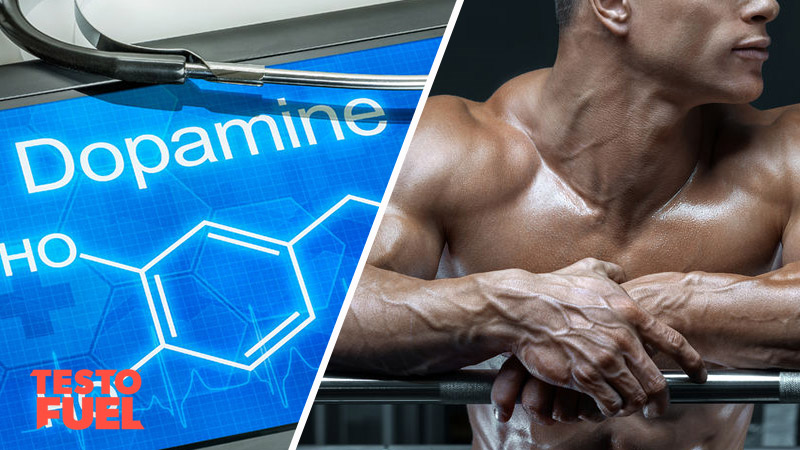TestoFuel Blog : Make Gains & Pack on the Muscle

Optimal health and performance requires fine tuning of your body – and this includes effective hormone functioning. In order to boost testosterone it is important to understand how it works alongside other hormones and messengers.
In this article we’ll tell you about this particular neurotransmitter and how it affects your T levels.
Dopamine (DOPA) is a neurotransmitter – a chemical that sends messages between nerve cells. It isn’t a hormone, but works alongside them to help your body run smoothly.
It is produced in two areas of the brain – the substantia negra and the ventral tegmental area. It has receptors in the adrenal glands and is from the same ‘family’ as epinephrine and norepinephrine.
The main role of this chemical messenger is to regulate mood, sleep and behavior – it is also heavily involved in cognition. It is most well known its role in feelings of pleasure and euphoria, therefore is often referred to as the ‘feel good’ hormone. This neurotransmitter regulates reward-motivation behavior [1] and reinforces us to perform certain activities if we get enjoyment from them. It is also involved in forming addictions for the same reason.
This neurotransmitter forms yet another part of the complex hypothalamic-pituitary axis which means that its production and release into the body is controlled by the brain. Imbalances can cause a number of illnesses such as Parkinson’s, psychosis and ADHD.
When balanced and optimized, this particular neurotransmitter ensures that you have plenty of energy and you feel vibrant, energized and confident. When it isn’t you’ll feel dependent, shy, obsessive and low on energy.
Key Point: Dopamine is a neurotransmitter that plays an important role in emotions, reward, pleasure and addiction.
Testosterone is the principle androgen hormone, responsible for providing us with muscle mass, libido, hair growth and strength. It regulates DOPA and vice versa – the two have a very reciprocal, bi-directional relationship.
The release of T from the testes is regulated within the brain as part of the hypothalamic-pituitary-gonodal axis (HPG).
The hypothalamus – located in the brain, releases a hormone called gonadotropin-releasing hormone (GnRH) which then signals the pituitary gland to release a hormone called luteinizing hormone (LH). This hormone then tells the testes to produce testosterone.
To illustrate the importance of the HPG working smoothly for T production, a study in the journal Endocrinology observed that when rats were given a solution that reduced DOPA, GnRH mRNA decreased by 67% [2]. Without enough GnRH, the pituitary gland does not receive enough of a stimulus to send LH to the testes. Ultimately this results in low testosterone production.
Similarly, a study published in The American Journal of Psychiatry found that when neurotransmitter blockers were given to 9 men, LH fell significantly. Not only that, there was a significant increase in the hormone prolactin which is another important part of the HPG system [3].
Prolactin is a hormone that decreases testosterone levels and works directly against DOPA so when it increases it’s a bad thing. It is the ‘brake’ to the testosterone ‘gas’ so it is important that it is kept in check, or prolactin will play havoc on your T levels.
So by now you know how important it is to get the levels of this neurotransmitter optimized for effective T production- the next questions is how? Here are our top tips:
Firstly you need to ensure you are getting enough vitamin D. This sunshine hormone activates receptor in the adrenal gland to produce DOPA, and protects against the depletion of not only this, but another mood regulating neurotransmitter called serotonin. The fact that the sun provides us with vitamin D helps to why many have the mood dysfunction ‘seasonal effective disorder (SAD)’ in the winter.
It also explains why your libido might be elevated in summer – vitamin D will boost your neurotransmitter and T levels, and in turn this increases your sex drive.
As a ‘target tissue’ for vitamin D, the male reproductive tract responds well to the nutrient by boosting T levels. A study in the journal Hormone and Metabolic Research reported that supplementing 3,332 IU daily for 1 year significantly increased both total and free T levels [4].
In order to optimize your neurotransmitter levels you need to ditch foods that are high in sugar, including high glycemic foods such as white bread, pasta and cakes. Not only will they affect your neurotransmitters, they’ll make your T levels plummet as well.
As an example of the damaging effect of sugar on T levels, a study in Clinical Endocrinology saw 74 men given 75g of glucose, and then monitored their testosterone levels. The changes were severe – on average, the volunteers experienced a 25% drop in T levels [5].
You should replace sugary foods with ones that contain tyrosine – an amino acid. Eggs, beef, avocados and milk will all help to lower stress, stimulate DOPA production and improve well-being. It just so happens that these are also all great T boosting foods too, so should form a staple part of your diet.
Dopamine is a neurotransmitter produced in the brain and from the same family as epinephrine.
The main role of this ‘feel good’ chemical messenger is to regulate reward-motivation behavior. It helps to control mood, sleep and behavior – it is also responsible for forming addictions to activities that we enjoy.
This neurotransmitter is very closely related to testosterone – when it is functioning effectively, so does T. Together they work to keep another hormone called prolactin at bay as it can have a negative impact on androgen production.
There are a number of things that you can do to optimize your neurotransmitter levels, including regular vitamin D from the sun, diet an supplement. You must also avoid sugar and high glycemic foods as they can reduce testosterone. It is also advised to eat tyrosine-rich foods as this amino acid helps to produce and regulate neurotransmitter levels.